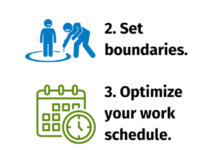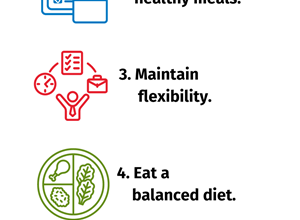Follow Your Gut and Get Screened
Fifty. It’s just around the corner for me, as much as I hate to admit it, and it’s time to schedule my first colonoscopy. It’s certainly not something that anyone really looks forward to, but it is a critical cancer screening tool that should not be avoided or delayed. According to the American Cancer Society (ACS), colorectal cancer (CRC) is the second most common cause of cancer death in the United States in men and women combined (American Cancer Society, 2021). CRC affects approximately 150,000 people each year, of which one third will not survive.
I had an opportunity to speak with Dr. Aparna Mele, a board-certified gastroenterologist and president and founder of My Gut Instinct, Inc., a health and wellness non-profit organization dedicated to increasing awareness of preventable diseases that impact community health. “At least 85% of CRC cases are sporadic, occurring in individuals without a family history of colon cancer, and the risk of colon cancer increases with every decade of life,” stated Dr. Mele. Initial stages of colorectal cancer (CRC) typically present without symptoms and thus often go undetected. However, Dr. Mele indicated that some patients may experience symptoms such as a change in bowel habits, diarrhea, constipation, bleeding, anemia, weight loss, or pain (A. Mele, personal communication, March 23, 2021). Early CRC screening is key and can catch cancer when it is small, hasn’t spread and can be easier to treat. “CRC remains one of the most preventable diseases in the U.S. because almost all colon cancers start out as a small growth called a polyp, which progresses to cancer over time. So, if you have polyps, they can be removed before they turn into cancer” (A. Mele, 2021).
“Thanks to widespread use of colonoscopy, the incidence and mortality rates of this disease are decreasing among those older than 50 years, yet increasing in younger individuals, for whom screening use is limited and key symptoms may go unrecognized,” states Dr. Mele. In 2018, the ACS published guidelines with a qualified recommendation to lower the starting age for CRC screening from 50 to 45 years of age in the average-risk adult population. Other important organizations are beginning to follow suit. The latest colorectal cancer screening guidelines released by the American College of Gastroenterology [ACG] this month includes a conditional recommendation to begin CRC screening in average-risk individuals between the ages of 45 and 49 years to reduce the incidence of advanced adenoma, CRC, and mortality from CRC (Shaukat et al., 2021). In addition, the U.S. Preventive Services Task Force (USPSTF) issued a draft recommendation last October 2020 to lower the starting age to 45 in adults at average risk of colon cancer with no symptoms. The task force is an independent panel of experts appointed by the Department of Health and Human Services’ Agency for Healthcare Research and Quality, an organization that has significant influence on policymakers (Holt, 2021). These preliminary recommendations are expected to be finalized this year and will require insurance plans, that are subject to rules under the Affordable Care Act, to cover the screenings.
Screening Recommendations
The ACS (2021) suggests the following screening recommendations for those at average risk for colorectal cancer:
- Individual at average risk should start regular screening at age 45.
- Individuals in good health and expected to live for at least another 10 years should continue regular screening through the age of 75.
- Individuals between the ages of 76 and 85 should discuss continual screening with their health care provider, taking into consideration personal preferences, prior screening results, overall health and life expectancy.
- Individuals over the age of 85 should no longer get screened for colorectal cancer.
Individuals at higher risk for colorectal cancer may need to begin screening before the age of 45. They should talk to their health care provider about the right time to begin screening, which test is right for them, and how often to get tested. Individuals considered at higher risk for colorectal cancer include those with (ACS, 2021):
- A personal history or a strong family history of colorectal cancer or certain types of polyps
- A personal history of inflammatory bowel disease (ulcerative colitis or Crohn’s disease)
- A family history of hereditary syndrome such as familial adenomatous polyposis (FAP) or Hereditary Nonpolyposis Colorectal Cancer Syndrome (Lynch syndrome)
- A history of radiation to the abdomen or pelvis to treat a prior cancer
Colorectal cancer screening is available in two forms: stool-based and visual examination.
Stool-based tests include (Centers for Disease Control and Prevention [CDC], 2021):
- Highly sensitive fecal immunochemical test (FIT) uses antibodies to detect blood in the stool; this test is conducted annually.
- Highly sensitive guaiac-based fecal occult blood test (gFOBT) uses the chemical guaiac to detect blood in the stool; this test is conducted annually.
- Multi-targeted stool DNA (MT-sDNA) or FIT-DNA (Cologuard®) combines the FIT with a test that detects altered DNA in the stool; this test is conducted every 3 years.
Visual examinations (CDC, 2021):
- Colonoscopy is used to check for polyps or cancer inside the rectum and the entire colon, this procedure is performed every 10 years (for people who do not have an increased risk of colorectal cancer).
- Computed tomography (CT) colonography, also called a virtual colonoscopy, uses X-rays and computers to produce images of the entire colon, which are displayed on a computer screen to be analyzed; this procedure is performed every 5 years.
- Flexible sigmoidoscopy (FSIG) is used to check for polyps or cancer inside the rectum and lower third of the colon; this procedure is performed every 5 years or every 10 years with a FIT every year.
The ACG advises colonoscopy and FIT as the primary screening methods for CRC screening. Dr. Mele notes that “All roads lead to colonoscopy,” meaning that an abnormality of any of the other screening tests would then mandate the need for diagnostic colonoscopy. She reiterates that the “best prevention strategy is having a colonoscopy to detect and remove polyps, and that colonoscopy is the only screening test that also allows removal of precancerous polyps before they turn into colon cancer.” Some private insurance companies may not yet cover the procedure for patients under the age of 50. For individuals unable or unwilling to undergo colonoscopy or FIT, either flexible sigmoidoscopy, multitarget stool DNA test, CT colonography or colon capsule are suggested (Shaukat et al., 2021). Dr Mele points out that, “In the end, the most important message is that SOME form of CRC screening is better than none at all.”
Dr. Mele also recommends a “healthy diet, high in fiber and low in fat, rich in fruits, vegetables, whole grains, and legumes, as a major preventative measure against colorectal cancer. Tobacco in any form in any amount can increase the risk of polyp formation and development of colon cancer. Daily exercise and maintaining an ideal weight will independently and collectively decrease multiple cancer risks, including CRC.” She encourages us to “start the conversation, spread the word, wear a blue ribbon, support awareness, and schedule colonoscopies for you and for those you love.”
March is colorectal cancer awareness month – follow your gut and get screened!
References
American Cancer Society (2021, February 4). When should you start getting screened for colorectal cancer? https://www.cancer.org/latest-news/american-cancer-society-updates-colorectal-cancer-screening-guideline.html
Centers for Disease Control and Prevention (2021, February 8). Colorectal cancer screening tests. https://www.cdc.gov/cancer/colorectal/basic_info/screening/tests.htm
Holt, C. (2021). Advocates for earlier colorectal cancer screenings win important ally. Oncology Times, 43(1), 9 – 10.
Shaukat, A., Kahi, C.J., Burke, C.A., Rabenkeck, L., Sauer, B.G. & Rex, D.K. (2021). ACG Clinical Guidelines: Colorectal Cancer Screening 2021. The American Journal of Gastroenterology. 116(3), 458-479. https://doi.org/10.14309/ajg.0000000000001122






